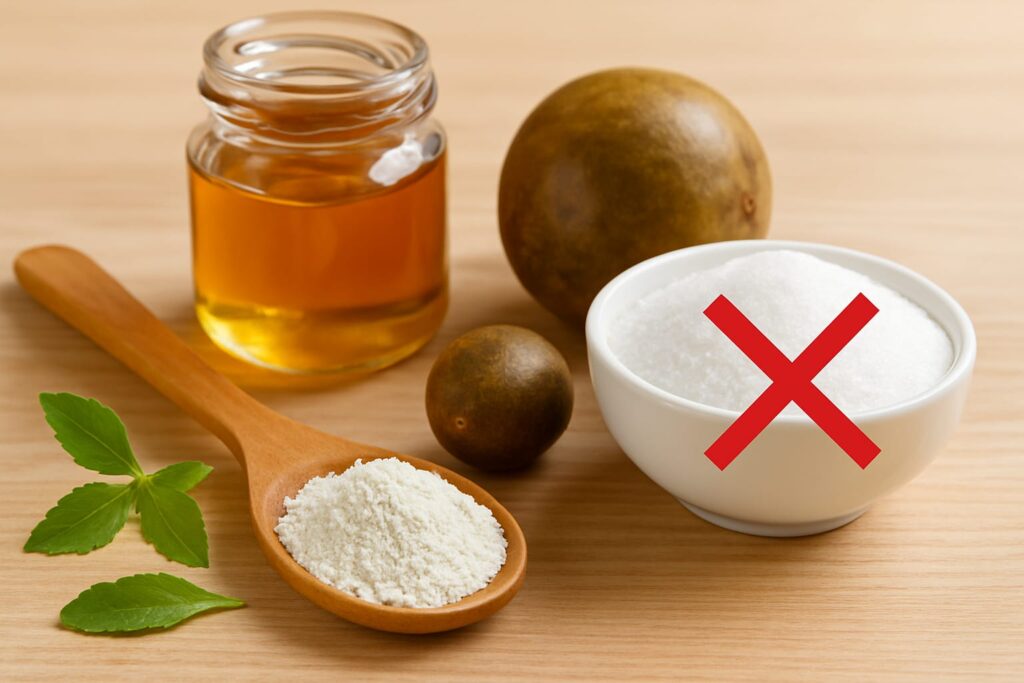Natural Sweeteners Benefits Risks
In recent years, the spotlight has shifted toward natural sweeteners as people search for healthier alternatives to sugar. Whether you’re managing diabetes, trying to lose weight, or just aiming for a cleaner diet, natural options like stevia, monk fruit, and honey have become popular choices. However, not all that glitters is gold. Understanding the natural sweeteners benefits risks is crucial before replacing sugar in your daily routine.
This comprehensive guide dives into the potential advantages and drawbacks of these sweeteners, backed by scientific evidence. Let’s explore what’s really behind the label of “natural.”

What Are Natural Sweeteners?
Before evaluating the potential advantages and concerns, it’s essential to clarify what qualifies as “natural.” A sweetener is considered natural if it’s extracted from whole food sources without significant chemical modification. Examples include:
- Stevia (from the Stevia rebaudiana plant)
- Monk fruit (Luo Han Guo)
- Raw honey
- Coconut sugar
- Maple syrup
- Agave nectar
- Date sugar
Each of these options offers a different taste profile, calorie content, and metabolic effect.
Natural Sweeteners Benefits Risks for Blood Sugar
Let’s begin with the bright side. Many natural sweeteners offer clear advantages when used properly.
1. Lower Glycemic Impact
One of the most widely recognized benefits is the minimal impact on blood sugar levels. Stevia and monk fruit, for example, contain no sugar or calories and do not cause glucose spikes. For individuals with diabetes or insulin resistance, this is a game changer.
Moreover, studies show that replacing table sugar with stevia can reduce post-meal blood sugar spikes by up to 18% (Anton et al., 2010).
2. Fewer Calories and Weight Support
Most natural sweeteners, especially zero-calorie ones like erythritol, monk fruit, and stevia, help reduce overall calorie intake. This can support weight loss or maintenance when paired with a healthy diet. Additionally, using these sweeteners in moderation may reduce sugar cravings and promote satiety.
Antioxidant and Anti-Inflammatory Properties
Some natural sweeteners, such as raw honey and maple syrup, contain antioxidants that help fight oxidative stress. Although they do contain sugar, their bioactive compounds offer additional health-promoting properties not found in refined sugar.
For example, dark maple syrup has been shown to contain over 24 different antioxidants (Li & Seeram, 2011).
Dental Health and Natural Sweeteners Benefits Risks
Xylitol, a sugar alcohol often included among natural sweeteners, is known for its ability to prevent tooth decay. While it’s technically a polyol, it’s naturally derived and has been proven to reduce cavity-causing bacteria in the mouth.
Potential Drawbacks of Natural Sweeteners
Despite their advantages, it’s essential to consider the natural sweeteners benefits risks ratio. Let’s look at some of the challenges and side effects.
1. Digestive Discomfort
Some options, especially sugar alcohols like erythritol and xylitol, can cause bloating, gas, and diarrhea in sensitive individuals. These compounds ferment in the gut, producing gas that leads to digestive issues for some people.
Although erythritol is generally better tolerated, excessive consumption may still cause discomfort.
2. Psychological Compensation and Overeating
Even if a sweetener contains zero calories, it might not contribute to weight loss if it encourages compensatory eating. The sweet taste may trigger cravings or lead people to feel they “earned” extra calories later. This behavior can undermine the potential advantages.
Natural Sweeteners Benefits Risks and Label Confusion
Just because a product is labeled “natural” doesn’t necessarily make it healthy. Agave nectar, for instance, is highly processed and contains a large amount of fructose, more than high-fructose corn syrup. Excess fructose intake has been linked to metabolic issues including fatty liver, insulin resistance, and elevated triglycerides.
Understanding how sweeteners are sourced and processed is key to making healthier decisions.
Allergies and Sensitivities
Although rare, certain individuals may have allergic reactions to specific natural sweeteners. For instance, stevia belongs to the same botanical family as ragweed, so individuals allergic to ragweed may want to use caution and test in small amounts first.
Comparing Natural Sweeteners Benefits Risks vs Artificial
To further assess the natural sweeteners benefits risks, it helps to compare them with artificial options like aspartame, sucralose, or saccharin.
|
Feature |
Natural Sweeteners |
Artificial Sweeteners |
|
Origin |
Plant-based |
Synthetic |
|
Calories |
Varies (0 to moderate) |
Usually 0 |
|
Glycemic Index |
Low to moderate |
Very low |
|
Taste |
May have aftertaste |
Can taste chemical |
|
Long-term safety |
Generally safer |
Some concerns remain |
In most cases, natural sweeteners are preferred for those avoiding synthetic chemicals. However, both types should be used in moderation.
Top Natural Sweeteners Ranked by Health Impact
To make informed choices, here’s a ranking of some of the most popular options based on their overall health profiles:
- Stevia – No calories, doesn’t affect blood sugar, and widely researched.
- Monk Fruit – Naturally zero-calorie and packed with antioxidants.
- Raw Honey – Offers nutrients but contains sugar; best in small amounts.
- Maple Syrup – Antioxidants present but high glycemic index.
- Coconut Sugar – Slightly lower glycemic index than table sugar, but still sugar-heavy.
- Agave Nectar – High in fructose; best avoided despite its “natural” label.
- Date Sugar – Nutrient-rich but calorie-dense; best used in whole food form.
How to Use Natural Sweeteners Safely
To gain the benefits while minimizing the risks:
- Check ingredient labels: Avoid sweeteners blended with fillers like maltodextrin or dextrose.
- Start small: Gradually introduce new sweeteners to test your body’s reaction.
- Use variety: Rotate between options to avoid building intolerance.
- Avoid overcompensating: Don’t use sweeteners as an excuse to indulge more elsewhere.
Balanced use is key to leveraging their full potential.
Who Should Be Cautious?
Although most people tolerate these alternatives well, some groups should be extra cautious:
- Individuals with IBS: Sugar alcohols can worsen symptoms.
- People with fructose intolerance: Avoid agave, honey, and coconut sugar.
- Infants under 2 years old: Honey should be avoided due to the risk of infant botulism.
If in doubt, consult with a healthcare provider or registered dietitian.
Final Thoughts on Natural Sweeteners
So, what’s the bottom line? The natural sweeteners benefits risks balance depends on the type you choose, how much you use, and your personal health needs. While natural sweeteners can be an excellent alternative to refined sugar, they’re not all created equal.
Some offer genuine health benefits when used sparingly, while others may lead to unintended side effects if overused or misunderstood. Being informed is your best defense.
FAQ – Natural Sweeteners Benefits Risks
Are natural sweeteners better than sugar?
In many cases, yes. Stevia and monk fruit, for example, do not raise blood sugar and contain no calories. However, it’s still important to consume them in moderation.
Which natural sweetener is safest?
Stevia and monk fruit are among the safest, especially for people with diabetes or weight management goals.
Can natural sweeteners cause digestive issues?
Yes, especially sugar alcohols like xylitol and erythritol. If you’re sensitive, start with small amounts.
Is agave nectar healthy?
Not really. Despite its natural label, agave is very high in fructose and can negatively impact liver health when overconsumed.
